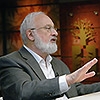Moses—The Manifestation Of The Point In The Heart
 Question: Is Moshe (Moses) a power within a person?
Question: Is Moshe (Moses) a power within a person?
Answer: Yes. This is a manifestation of the point-in-the-heart, which at some stage occurs in a person or in a group.
Question: What is the difference between Moses and Abraham?
Answer: This is the same striving for the Creator, but on different levels.
The point-in-the-heart begins to develop, to swell at the cost of egoism. It takes on all the egoistic qualities and forms. Otherwise, it is impossible to start acting toward the Creator if we do not plunge into egoism. Therefore, Moses must plunge into the ego, it is no wonder he was brought up in Pharaoh’s palace by Pharaoh’s daughter Batya. After that, he is ready for his mission.
But to fulfill it, he needs to completely break away from his adopted grandfather and foster mother. Then there is a state where he is forced to flee from Egypt even though he is a prince. He runs away.
He runs away, as they say, abroad, where he meets his future wife Zipporah, the daughter of Jethro. They have two children. But after a while, he returns to Egypt again, leaving his wife and children.
Question: When you tell this, do you not imagine all these people who went somewhere, came, and gave birth to children?
Answer: No, of course not. But that is how it is written. Very easy!
Question: If we consider these events from the point of view of the ten, where am I running away from the ten? What is going on in it?
Answer: You are not running away from the ten. When people in the ten begin to realize that they cannot reach the Creator, then they have a precise definition of what their essence, their spiritual root, is.
They begin to unite even more among themselves. They reach the point-in-the-heart, which is called Moses, and begin to work around it. In the end, they find that this point is under the authority of Pharaoh, under the authority of their egoism, and therefore there is no hope of rising above it, to the point that they are forced to completely abandon its use, yet mechanically, artificially.
Question: What does it mean: Moses runs away and lives in the desert for 40 years?
Answer: This means that he breaks away from his egoism and does not want to use it. This is not yet an exit from Egypt, but it is already a breakaway.
Moses (the-point-in-the-heart) exists as if separate from, independent of egoism. Therefore, when he returns to Egypt, he is absolutely the opposite of Pharaoh. He does not look at him as his grandfather. This is a brand-new personality that comes and demands: “You must let my people go.”
[277295]
From KabTV’s “Spiritual States” 4/15/19
Related Material:
Moses
The Higher Desire, “Moses”
The Role Of Jethro In The Making Of Moses







Discussion | Share Feedback | Ask a question